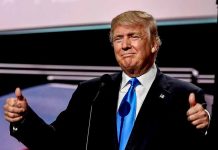
Democratic PAC files FEC complaint over Trump-Musk interview, raising questions about media bias from both Republicans as well as Democrats and their influence in elections.
At a Glance
- End Citizens United filed an FEC complaint regarding Trump’s interview with Elon Musk on X
- The PAC claims the interview was an illegal corporate contribution to Trump’s campaign
- The complaint argues that X’s resources used for the event violate campaign finance laws
- Critics question the complaint’s validity, citing potential double standards in media coverage
Democratic PAC Takes Aim at Trump-Musk Interview
In a move that has raised eyebrows among conservative voters, End Citizens United, a Democratic political action committee, has filed a complaint with the Federal Election Commission (FEC) regarding former President Donald Trump’s recent interview with tech mogul Elon Musk. The interview, which took place on Musk’s social media platform X, has become the center of a debate over campaign finance laws and media bias.
The complaint alleges that the two-hour interview constituted an illegal corporate contribution to Trump’s 2024 presidential campaign. End Citizens United claims that the resources used by X to support the event are not protected by the media exemption in campaign finance law.
This move has sparked discussions about the role of social media platforms in political discourse and the apparent double standards in scrutiny applied to conservative figures versus liberal-leaning media outlets.
Democratic PAC files FEC complaint over Trump-Musk interview https://t.co/LynoaQ2LjB
— The Hill (@thehill) August 14, 2024
Questioning the Motives Behind the Complaint
Conservative analysts are questioning the motives behind this complaint, pointing out the stark contrast between the treatment of Trump’s interview and the often-unchallenged coverage provided by mainstream media outlets to Democratic candidates. The interview, which covered topics ranging from immigration to the economy, and even included discussion of an attempted assassination on Trump, has been viewed by many as a refreshing departure from the typical media narrative.
“The Donald Trump-Elon Musk campaign rally hosted on X wasn’t just an incoherent diatribe of lies marred by technical difficulties, it was a blatantly illegal corporate contribution to Donald Trump’s campaign,” End Citizens United President Tiffany Muller said in a statement.
This statement has been met with skepticism from Trump supporters and free speech advocates who see it as an attempt to stifle alternative platforms for political discourse. They argue that the interview provided a necessary counterbalance to what they perceive as overwhelmingly negative coverage of Trump by traditional media outlets.
The Broader Implications for Political Discourse
The complaint against the Trump-Musk interview raises important questions about the future of political communication in the digital age. As social media platforms continue to play an increasingly significant role in shaping public opinion, the lines between traditional media, personal expression, and campaign activities become increasingly blurred.
“Here — the considerable resources of X to host Trump’s campaign event, including dedicating real-time staff to address technical difficulties specifically for the campaign event and the time of its owner to participate in the event — are of significant value to the Trump Campaign,” the complaint reads.
Conservatives argue that this scrutiny is selectively applied, pointing out that mainstream media outlets often provide extensive, favorable coverage to Democratic candidates without facing similar accusations of making corporate contributions. This perceived double standard fuels concerns about the erosion of free speech and the potential for regulatory bodies to be used as tools for political suppression.
Looking Ahead: The Battle for Fair Media Coverage
As the 2024 presidential race heats up, the Trump-Musk interview controversy underscores the ongoing struggle for balanced media coverage. Conservative voters and media watchdogs are calling for equal application of scrutiny across the political spectrum, emphasizing the importance of diverse voices in the national conversation.
The outcome of this FEC complaint could have far-reaching implications for how politicians engage with voters through new media platforms. As the digital landscape continues to evolve, it’s clear that the rules governing political communication will need to adapt as well, hopefully in a way that preserves free speech and ensures a level playing field for all candidates, regardless of their political affiliation.






















